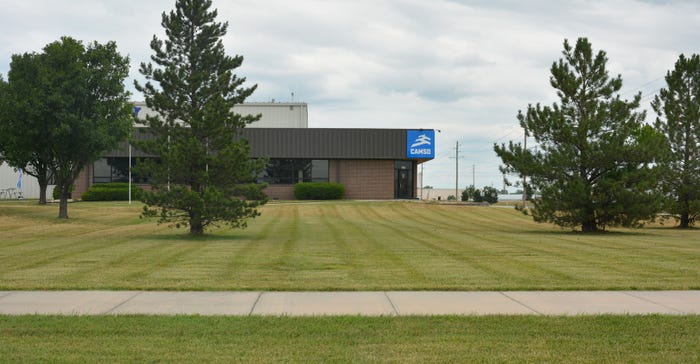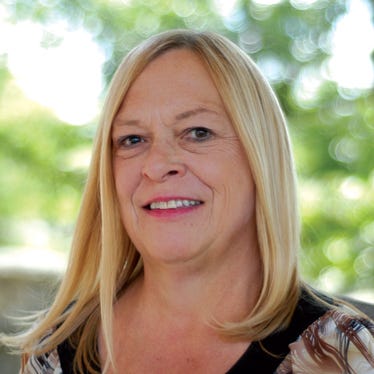
NEW CAMSO PLANT: The factory where Camso will remanufacture wheels and tracks for agricultural equipment is now being set up. It is just down the road from the company’s existing factory for manufacturing new track in Emporia, Kan.
The market for tracked vehicles in agriculture is booming.
“As recently as five to 10 years ago, tracked machines had about 20% of the market,” says Martin Lunkenbein, service and aftermarket sales executive director of agriculture at Camso, a leading manufacturer of tracks for agricultural equipment. “Today, it is really increasing. Some platforms are at 40% of the market and the trend is toward more and more vehicles being tracked. We’re seeing tracks on grain carts, sprayers and planters as well as combines and tractors.”
Part of the reason is the value that operating tracked equipment provides to farmers.
“We have documented about a 5% increase in yield with planters using tracks versus tires,” Lunkenbein says. “Part of that is attributable to reduced compaction which allows for better root development and increased water absorption in the soil. Aerial photography has also shown us that emergence is more uniform.”
In addition, the improved traction of tracked vehicles results in fuel savings over vehicles with tires.
“We’ve determined that the cost of conversion from tires to tracks is paid for in savings and added production in just one year,” he says.
It was that rapid increase that led Camso, which has headquarters in Quebec but does all of its ag track manufacturing in the U.S., to launch a new division to remanufacture tracks.
After a little more than a year of working to perfect the process, Camso is outfitting its remanufacturing facility in Emporia with newly designed and engineered machinery, and will begin producing remanufactured tracks and wheels.
The building now being outfitted is near the factory where Camso currently makes new tracks that it supplies to all the major equipment makers, including Agco, CNH, John Deere in the U.S, and Claas in Europe. It also operates a factory in Iowa to supply some of these major equipment makers with track systems.
At an open house event to announce the official launch of the reman program, Camso brought in company executives as well as its distribution and sales force to give them a look at the new facility and a preview of how the program will work. They expect to be in full operation within the next three to six months.
Since it started the reman pilot last summer, Camso has been accepting worn tracks for remanufacture, which has allowed them to perfect and test the program to make sure the reman tracks can be certified to have the same quality and dependability that Camso customers have come to expect the company’s new tracks.
“Camso has a major advantage as the industry leader in new track manufacture in that we know the materials and technology that went into the originals, which gives us proprietary knowledge about how to make reman tracks with those same materials,” he says.
Lunkenbein says the plan is to have an inventory of remanufactured tracks available from dealers in its network but also to offer a rapid turnaround for customers who want to have the tracks they have been running on remade.
“Our goal is that a customer who wants to use his own track carcass can call and make an appointment," he says. "Then he can remove his tracks and bring them to the facility and we would remake them. In 24 to 48 hours, he’d be headed home with new tracks.”
Customers can also choose to return their used tracks for reman but purchase the shelf-ready product at a reduced price to compensate them for the value of their returned carcass. The price point of a reman track is about 60% of the cost of a new track, but it will have comparable performance and wear to that of a new track. Tracks can continue to be reused as long as the internal structure of the core is sound — probably as many as three or four times.
“It’s a game changer in the way people buy and use tracks and wheels,” Lunkenbein says, “Customers can now think of a product that provides the lowest operating cost through its first life, while considering the multiple lives that can be delivered after its initial cycle. A track carcass and wheel core still have a value and can be remanufactured as long as they are not worn to the bone.”
Lukenbein says there are still some logistics to figure out as the program gets under way.
“We have become very good at pushing product from the factory out through our distribution system,” he says. “Now we have to work out how to move product back from the customer and into the factory. We also need to work on educating or customers about when it is time to replace tracks. If you wear that tread down where you can see the steel cable, that’s too far. We’ll be providing a guide to our dealers to help with that.”
For more information, visit camso.com or email [email protected].
Camso is expanding with new Junction City plant
In addition to kicking off its remanufactured product line in Emporia, Camso is expanding production of new tracks at a second Kansas facility in Junction City.
The company bought a 139,000 square-foot building that it expects to have remodeled, equipped and in operation by January of 2020.
The plant will initially employ about 35 additional workers, and is expected to provide enough space to meet future demand.
“We chose Junction City for that plant because it is close enough for us to be able to move easily between facilities and because there is an excellent labor pool in the Junction City area,” says Hugues Lajoie, vice president and general manager of agriculture for Camso.
Camso has worldwide operations making variety of tracks, tires, wheels
Camso, formerly known as Camoplast Solideal, is a world leader in designing, manufacturing and distributing off-road tires, wheels, rubber tracks and undercarriage systems.
It has four business divisions: power sports tires and tracks, including for snowmobiles; construction tires and tracks for skid steers and backhoes; materials handling, including the loading and unloading equipment used in ports; and warehouses and agriculture, including tires and tracks for combines, tractors, sprayers, planters and more.
Based in Magog, Quebec in Canada, Camso has research and development centers and manufacturing plants in North and South America, Europe and Asia.
About the Author(s)
You May Also Like






